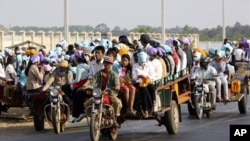In the wake of deadly crackdowns on demonstrations a year ago, and facing continued firings of union members, trade leaders say they have been forced to change tactics.
The labor movement won a small victory in wage disputes, earning a raise in the minimum wage from $100 per month to $128, but it has cost them much.
Buyers have proven reluctant to make orders, and factories continue to fire union members they see as troublemakers. Union leaders say this is forcing them to change the way they operate, away from demonstrations and towards appeals to buyers directly.
“This year [2014], we had more than 250 workers [get fired],” said May Sopheaktra, general secretary of the Cambodian Alliance of Trade Unions. “In 2013 we only had about 30 to 40 people. People have been fired since they started asking for $166 dollars, then $177 dollars.”
At least five unions have actively pushed for an increase in the minimum wage, as the cost of living continues to rise, putting a squeeze on the estimated 600,000 workers currently employed in the sector. But many union workers have been fired, particularly in factories in Phnom Penh and the provinces of Kampong Cham, Kandal and Svay Rieng.
Pao Sina, president of the Collective Union of Movement of Worker, said protests now risk the lives of workers. At least five people died in a government crackdown on demonstrations a year ago. “We don’t want to protest, since we don’t want a confrontation, and we don’t want buyers to be so nervous,” he said in an interview last week.
Aside from those dangers, unions leaders tend to get fired, he said. “Sixty leaders were fired in 2014,” he said. Just two were fired in 2013. “They don’t cite the reasons for firing them. They use this language: ‘They are involved in rebellion.’”
Labor unrest has meanwhile meant a decline in buyers’ orders. Pao Sina said labor leaders are now trying to talk with them directly to convince them to stay. Union leaders say they have spoken face to face or had written communications with major brands, like Puma, Adidas and others.
Protests have decreased, from 147 in 2013 to 108 in 2014, according to the Garment Manufacturers Association in Cambodia, or GMAC.
Pao Sina said this is a result of the crackdowns, as well as the courts, with questioning and detentions of labor leaders scaring other workers. “They are exhausted now,” he said.
Six union leaders have been warned by the courts not to get involved in public gatherings, and no union meetings have taken place since the $128 wage went into effect, Jan. 1.
Chea Mony, president of the Free Trade Union, whose brother, Chea Vichea, also a labor organizer, was murdered in 2004, said union leaders continue to face mistreatment at factories, even if they are simply alerting bosses to poor conditions. “They look for, for example, whether the temperature is too high or there are not enough fans,” he said.
Yang Sophoan, president of the Cambodian Alliance of Trade Unions, said she still wants a better wage for workers and is willing to protest, but she can’t do it without support. “I want to protest, but it is impossible when I do it alone,” she said.
Tun Sophoan, coordinator for the International Labor Organization in Cambodia said they have worked to help unions operate within the legal system, but the lack of a labor court has made problem-solving difficult. “We have sent complaints on behalf of the unions to the [Ministry of Labor],” he said. Earlier this year, the ILO released a statement calling on global brands to help Cambodia absorb a wage increase.
“It is important that all sides work together to ensure Cambodia’s garment industry remains economically viable,” Maurzio Bussi, the ILO’s country director for Thailand, Cambodia and Laos, said in the statement. “We call on the global brands to play their part.”
Heng Suor, a spokesman of Labor Ministry, could not be reached for comment.
Meanwhile, labor leaders continue to worry about the current environment for workers. May Sopheaktra said he’s already had one of his labor leaders fired, on Jan. 9.
“We submitted a letter to ask why,” he said. “They said they’d don’t want to negotiate. They said, ‘You can file a complaint to wherever you want; we will go when the ministry summons us.’”






